Top Forex Brokers
The difference between success and failure in Forex / CFD trading is highly likely to depend mostly upon which assets you choose to trade each week and in which direction, and not on the exact methods you might use to determine trade entries and exits.
So, when starting the week, it is a good idea to look at the big picture of what is developing in the market as a whole, and how such developments and affected by macro fundamentals, technical factors, and market sentiment.
Read on to get my weekly analysis below.
Fundamental Analysis & Market Sentiment
I wrote in my previous piece on 10th September that the best trade opportunities for the week were likely to be:
- Long of USD/JPY. The currency pair saw an increase of 0.59% over the week.
- Long of WTI Crude Oil futures. The future saw an increase of 1.54% over the week.
The total profit was 2.13%, representing an average gain per asset of 1.06%.
Over the past week, risk sentiment has soured quite strongly, and the main reason for this is the Fed’s policy meeting last Wednesday which produced a “hawkish hold”. While the Fed left rates unchanged as expected, the Fed now expects it will raise rates again by 0.25% later in 2023, meaning the terminal rate of the current tightening cycle is not yet reached. While the Fed still expects it will then go on to cut rates in 2024, it now expects it will make only 2 cuts of 0.25%. This hawkish surprise triggered a further advance in the US Dollar and US Treasury Yields (the 2-Year yield reached a new 15-year high above 5%), while stock markets sold off quite strongly. Riskier currencies and commodities suffered much less, if at all.
The other major event last week was the Bank of England’s narrow vote to leave its interest rate unchanged, by 5 members to 5. The Bank had been expected to agree to hike rates, even though British inflation data had just shown a surprisingly low annualized rate, of 6.7% when 7.0% was expected, so this was a dovish surprise from the Bank of England just after the hawkish surprise the previous day by the Fed. This has triggered weakness in the British Pound, which was the weakest major currency last week, and put the GBP/USD currency pair in focus.
The Swiss National Bank made a surprise rate hold last week, after being widely expected to raise its interest rate by 0.25% to 2.00%.
Markets will likely see a quieter agenda over the coming week with relatively few high-impact data releases due, so it is difficult to what might trigger a change in risk-off sentiment, at least until Wednesday’s release of US GDP data which could produce a change in feeling concerning the Fed’s likely future course over the near term.
Last week’s other key data releases were:
- Canadian CPI (inflation) – a little higher than expected.
- Bank of Japan Monetary Policy Statement – no surprises.
- US Unemployment Claims – met expectations.
- RBA Monetary Policy Meeting Minutes – met expectations.
- New Zealand GDP – better than expected, with a quarterly increase of 0.9% with only 0.4% expected.
- Flash Manufacturing & Services PMI for USA, Germany, UK, and France – mixed, but overall, a bit worse than expected.
The Week Ahead: 25th September – 29th September
The coming week in the markets is likely to see a lower level of volatility than last week, as there are considerably fewer high-impact data releases scheduled. This week’s key data releases are, in order of importance:
- US Core PCE Price Index
- US Final GDP
- US CB Consumer Confidence
- Australian CPI (inflation)
- US Unemployment Claims
- Canadian GDP
- US Revised UoM Consumer Sentiment
- German IFO Business Climate Data
- China Manufacturing PMI
Technical Analysis
US Dollar Index
The week price chart below shows the U.S. Dollar Index advanced last week for the tenth consecutive week, to close at a new 6-month high price, continuing its long-term bullish trend. A few weeks ago, it made a bullish breakout beyond the upper trend line of a long-term descending wedge pattern, as I had forecasted.
The price ended the week near the top of its range and printed a bullish pin bar. These are bullish signs, but it should be noted that the price failed to get established above the key resistance level which I have identified at 105.36.
The Dollar is in a long-term bullish trend evidenced by the price trading above its levels from 3 months and 6 months ago.
I see the US Dollar as having bullish momentum, which means it is probably a good idea to only look for long trades in the US Dollar this week. However, bulls should beware of the resistance level at 105.36, and of the fact that the momentum of the trend is showing signs of slowing down.
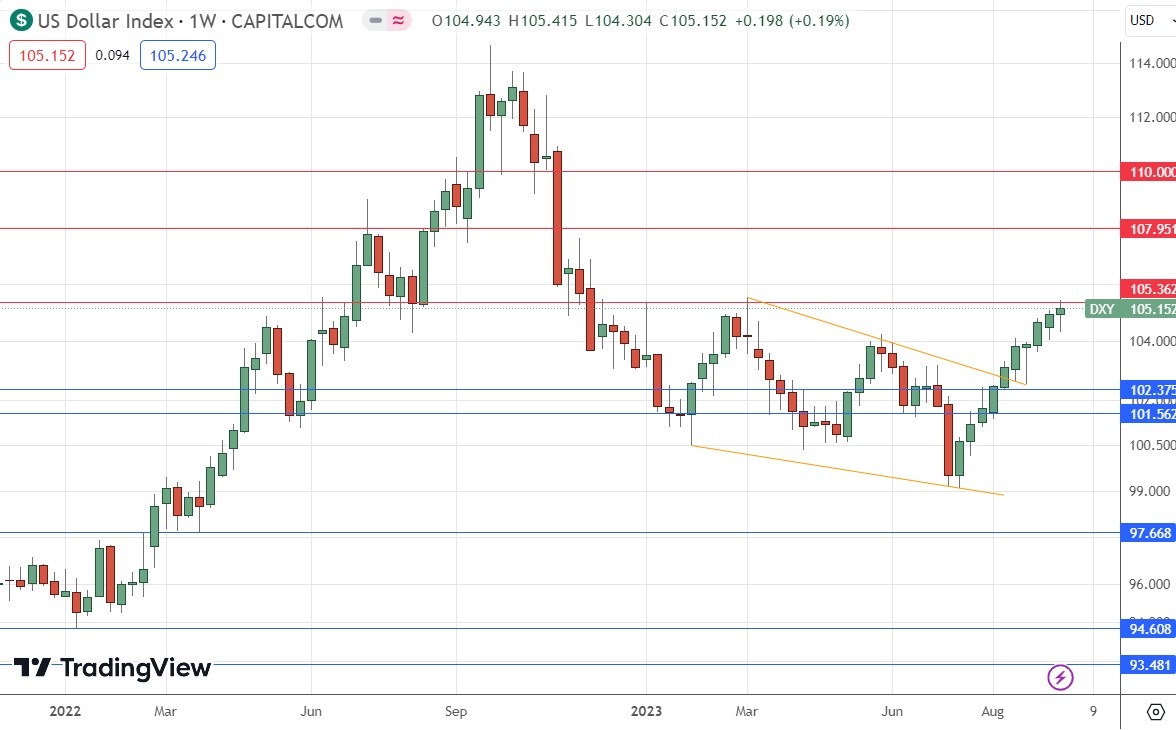
GBP/USD
The GBP/USD currency pair printed a very bearish weekly candlestick, which closed right at its low, making the lowest weekly close in 6 months.
This pair is in focus right now as the US Dollar is strong and trending up, while the British Pound has seen renewed selling since the Bank of England narrowly voted to pass on an expected rate hike last week, while British inflation data came in lower than expected. These lead to a lowering of expectations concerning rate hikes, which weakens the currency.
The price chart below shows a cluster of resistance levels below beginning at $1.2168. I think the price is likely to reach this level during the coming week. If it can break below all three support levels in that area, it will probably head for the big round number at $1.2000 where the price would be likely to consolidate for some time.
I see this currency pair as a good one to trade over the current week, looking for short trades, but being mindful of price targets at $1.2168 and $1.2000. This pair often finds a convincing direction when it is breaking to new prices early in the London session.
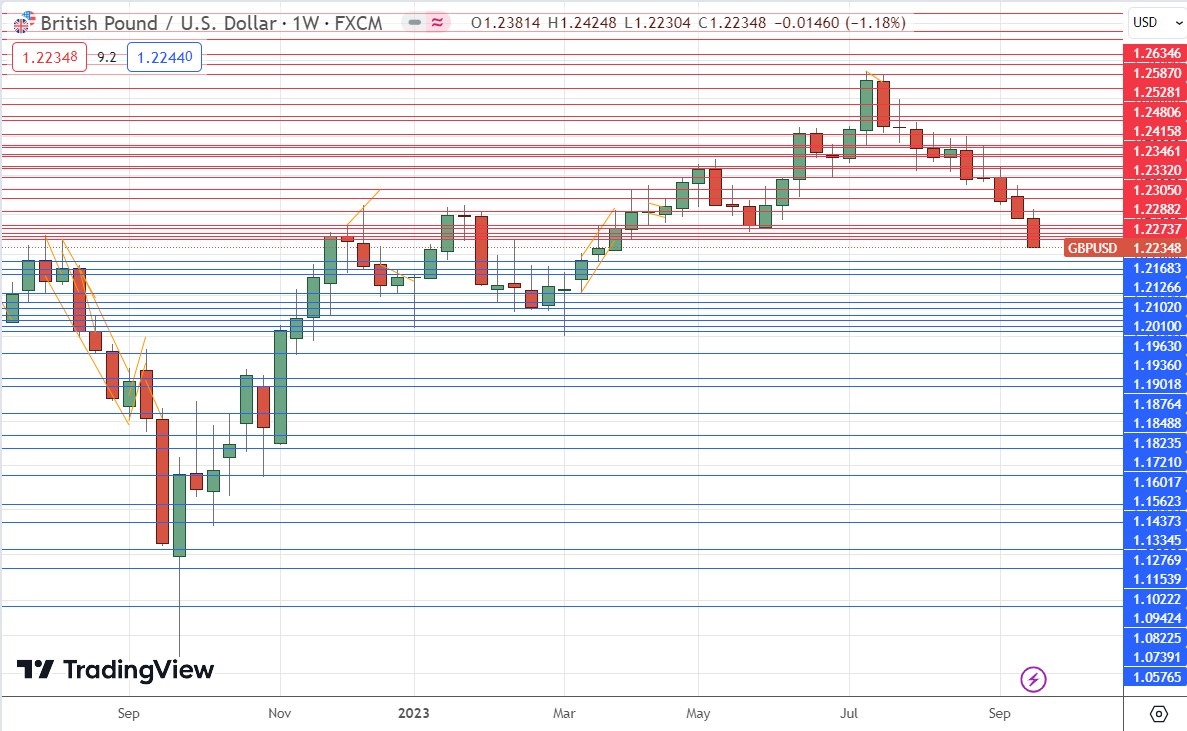
USD/JPY
The USD/JPY currency pair printed a bullish candlestick which was close to being a pin bar, but not quite. We saw a relatively small range over the week, but the price made the highest weekly close seen in almost an entire year. The price also closed quite near its high, which is another bullish sign. However, the low volatility does suggest that this bullish movement might be running out of momentum.
I still see this currency pair as a long-term buy due to the very loose monetary policy of the Bank of Japan, as well the long-term downwards trend in the Yen. However, the Bank of Japan and the Japanese government have started to make comments recently which tend to trigger sudden rises in the Yen, and there is a sense that the Japanese authorities will look to intervene if the Yen continues to weaken much further. This and the low volatility might make things a bit risky for bulls, but there are good fundamental and technical reasons to look for long trades in this currency pair in the meantime.
It is also true that the big round number at ¥150 produced a strong bearish reversal the last time it was reached – it could do so again.
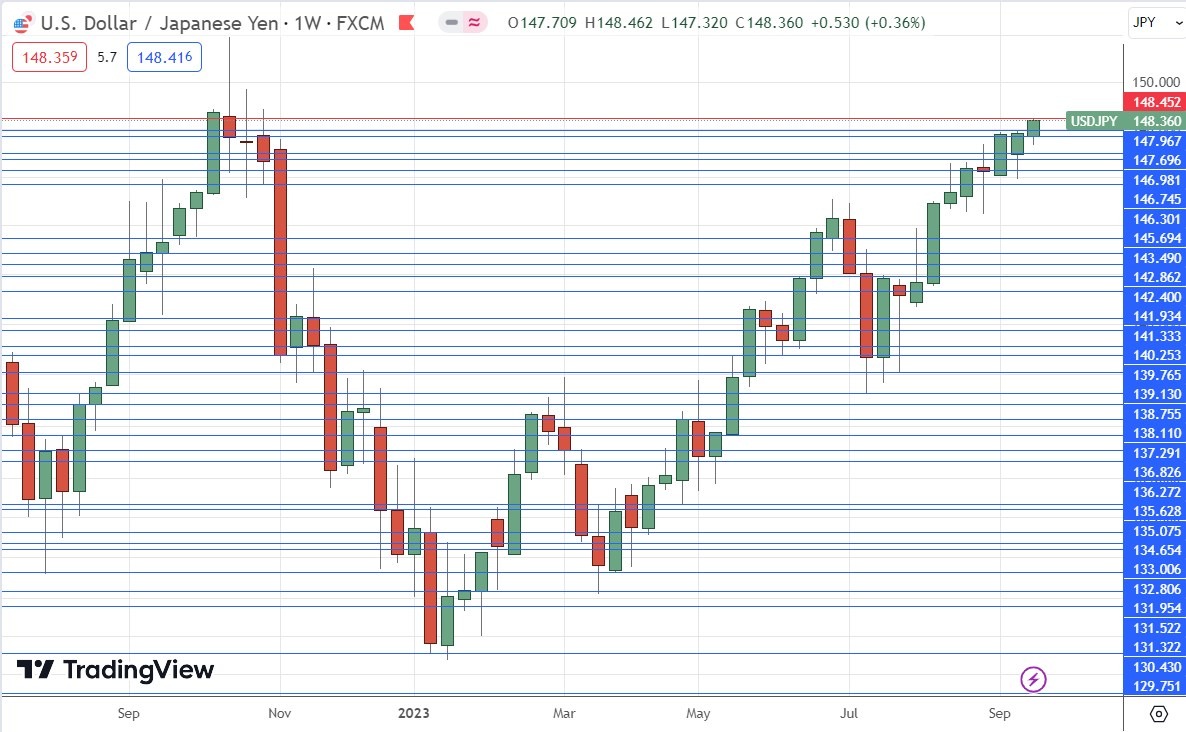
WTI Crude Oil
The current WTI Crude Oil future lost some ground over the past week, after breaking out to new 9-month highs recently. The daily chart below shows a downwards move and then a weak recovery towards the end of last week.
The deterioration in risk sentiment, or at least its secondary effect of suggesting we will see a stronger slowdown in global economic growth, is bad news for crude oil bulls,
However, there is a valid long-term trend and OPEC has recently taken restrictive measures. Trend trading commodities long when they make bullish breakouts to new long-term high prices has historically been a very profitable trading strategy.
I still see WTI Crude Oil as a buy, but only following a daily close above $92.10. That would put the price into blue sky, but the very large round number at $100 might act as natural resistance.
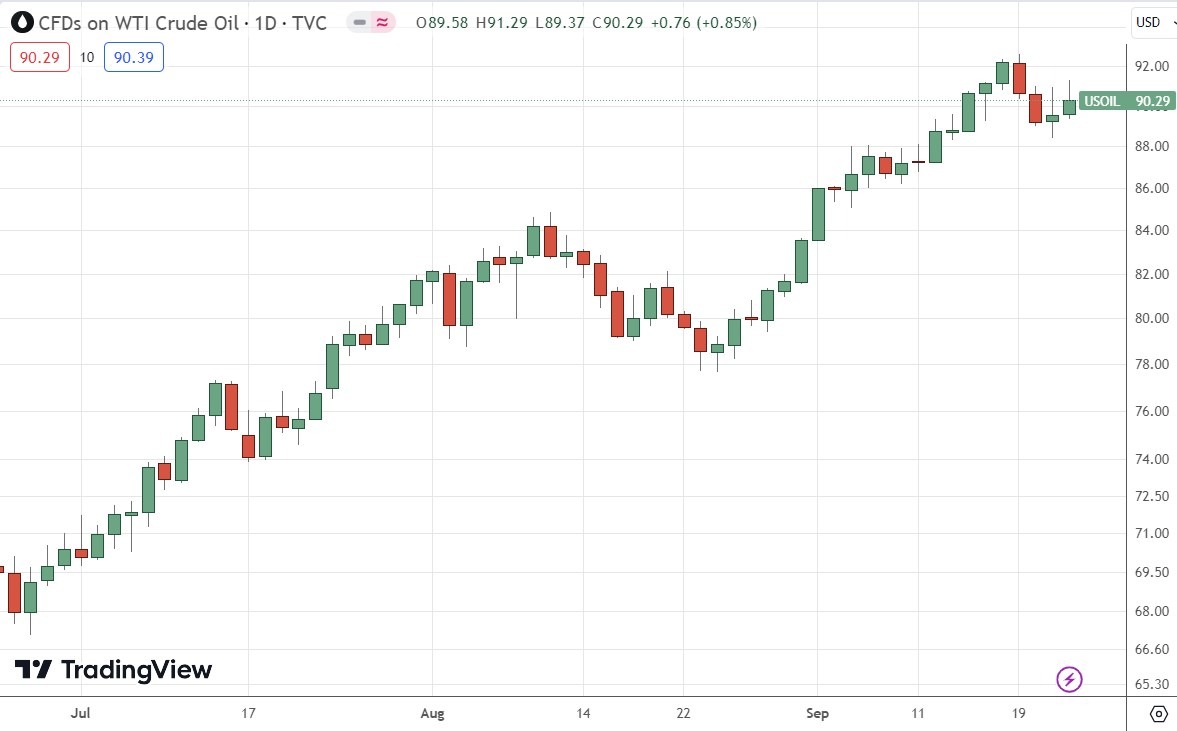
NASDAQ 100 Index
The NASDAQ 100 Index fell strongly over the past week, closing just above the key support level which I identified at 14657. It probably continues down as a zone of support, to approximately 14,500.
Stocks have taken quite a heavy knock, despite all the current fascination with AI tech which has lifted tech indices strongly since the start of 2023. Now markets are being led to believe a more hawkish scenario by the Federal Reserve, we are seeing major stock indices tumble.
The price seems to have arrived at a very pivotal area. We saw an attempt at rallying from this zone on Friday, but the Index gave up almost all its earlier gains by the end of today.
I do not want to be long of stocks except in terms of a very long-term investment. Short selling can be very dangerous and is likely best left to experts, but we may see a stronger fall here if we get a daily close below 14,500.
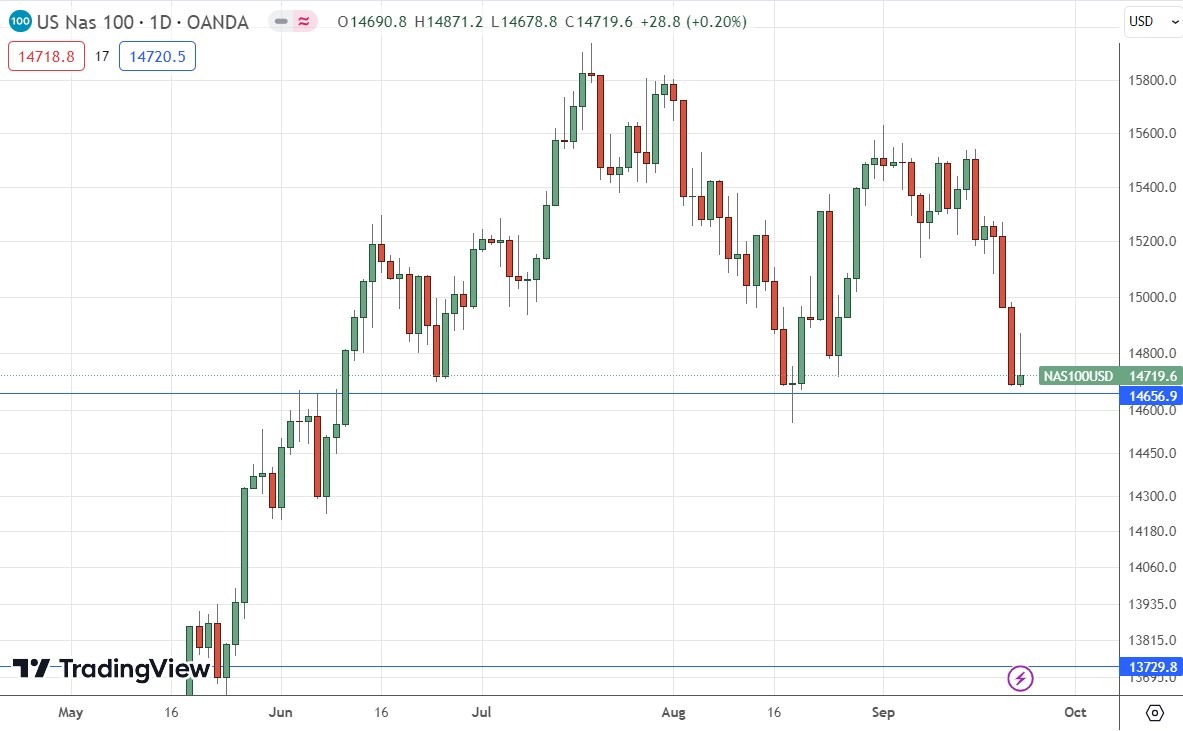
No. 11 Sugar Futures
Last week saw No. 11 Sugar futures reach a new multi-year high price. Sugar has been in a long-term bullish trend since November 2022, and the trend has accelerated strongly during the past few weeks.
Trend trading commodities long when they make bullish breakouts to new long-term high prices has historically been a very profitable trading strategy. There is also a fundamental factor supporting the bullish trend: an ever-growing and high demand for sugar globally.
The problem for bulls is that if you drill down to a daily chart, although a new high was made last week, the price is really breaking to new highs. However, the bearish pullbacks which we have just seen look quite weak and the price is not far from the recent high.
Therefore, I see Sugar as generally a buy, but the best time and safest entry method will likely be after we see a daily close above $27.50, which is above the highest recent daily close at $27.44 and is also a major quarter-number.

Bottom Line
I see the best trading opportunities this week as:
- Short of the GBP/USD currency pair targeting a take profit of $1.2168.
- Long of the USD/JPY currency pair.
- Long of No. 11 Sugar futures following a new daily close above $27.50.
- Long of WTI Crude Oil futures following a new daily close above $92.10.
Ready to trade our weekly Forex forecast? Here are the best Forex brokers to choose from.
